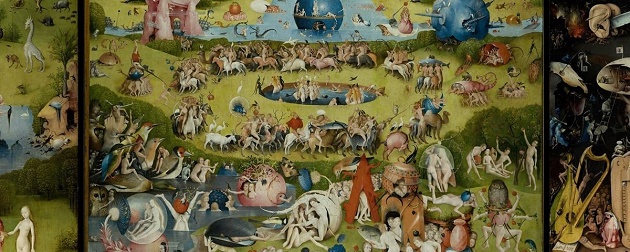Freedom needs spiritual values, internalised discipline and self-government. The truth will set us free, Jesus promised.
 The Garden of Delights, by Jeroen Bosch (1450-1516).
The Garden of Delights, by Jeroen Bosch (1450-1516).
This week in the Netherlands we vote on the endorsement of the Ukraine-EU association agreement. Unfortunately, this is not just a Dutch matter. The sole and cynical purpose of the initiators of this referendum is to destroy the European Union. If the vote is negative–and polls suggest it will be–that has implications for Ukrainians first, and for Europeans in general.
The Eurosceptic initiators play on popular fears concerning refugee and migration issues. That the referendum is about Ukraine is actually coincidental. They have found a way to raise enough signatures via the internet to demand the first of what they hope will be a series of referenda on various issues to ‘democratise’ politics, they say, demanding popular involvement. Which may sound democratic, but is moving towards Facebook politics–and we all know what rubbish people post there.
While not legally binding, a negative result could force the government to re-appraise its earlier approval of the agreement which has to be ratified by all 28 EU members. The BBC reported on the Ukrainians’ dream for their country to escape the pit of corruption and chaos. “They are still struggling to climb out. Dutch voters should not step on their fingers.”
I’m upset that Dutch activists are so callous to the aspirations of the Ukrainians, and that the indifference and ignorance of the Dutch public on this issue is aiding and abetting their efforts to give Putin a victory; especially given the evidence of top-level Russian implication in the downing of MH17. Whether consciously or not, these populists are effectively part of Putin’s European Trojan horse. All their arguments are standard Russian propaganda.
SPECTACLE
So what does this have to do with the Jeroen Bosch painting, ‘The Garden of Earthly Desires’ pictured above? Well, it’s about freedom’s borders. This weekend Romkje and I visited the sold-out exhibition of the celebrated Dutch artist’s works brought together in his home town of Den Bosch for the first time ever. Bosch was strongly influenced by the Modern Devotion movement, as I wrote earlier, and dealt with themes of good and evil, virtue and sin, heaven and hell in surprising and arresting new ways in his art. While sometimes portrayed as a pornographer, he was actually a moralist warning of the consequences of false freedom.
The scene depicted above of naked riders circling on animals can be understood as a satire on the spectacle of the princely courts of his day. Set between panels depicting paradise and hell, the centre-piece declares that freedom needs restraints.
Which may sound like the populist argument against open borders: ‘we need to protect our freedom by building walls to keep those different from us out.’ But building walls is not the same thing as guarding borders. Walls prevent people from coming in. Borders regulate traffic.
This issue is crucial in Europe today: freedom and borders. The theme of the State of Europe Forum in Amsterdam next month (May 8 & 9) is the paradox that freedom needs borders to be sustainable. We are witnessing a polarisation between those demanding walls and a return to nationalism, and those pleading for openness. Some suggest while that is a healthy tension in a democracy, an open society needs to seek for the moral middle.
PERSUASION
In a post-modern, post-communist and post-national world without borders, democracy and neo-liberal capitalism were assumed to be the global future. Most are awakening to the illusion of that dream. But is the answer to erect walls and return to nationalism? Finding that moral middle will be hard work.
Bosch touches on the heart issues of freedom. True freedom begins in the heart, being rightly related firstly to God, then to fellow humans. Freedom in this sense needs spiritual values, internalised discipline and self-government. The truth will set us free, Jesus promised. And where the Spirit is, there is freedom.
Yet Bosch painted not for religious institutions but for princes, kings and emperors: players in the world of politics and power. So how does that translate to our situation in Europe today? The debate on freedom and borders is one that we as followers of Jesus must not sidestep and spiritualise. Yes, Paul tells us that the weapons of our warfare are not carnal but are powerful for pulling down spiritual strongholds. Prayer is crucial.
But Paul also understood the power of persuasion (Acts 13:43; 17:4; 18:4; 19:8; 28:23). A Norwegian politician once challenged a YWAM colleague asking: ‘why do you Christians offer answers to questions we don’t ask, but not to those we do ask?’
That’s why we gather in Amsterdam in five week’s time: to understand the questions today, to seek for that ‘moral middle’, and to learn how to persuade on issues about freedom concerning refugees and migrants, responsible creation care, the family, the role of the churches in Europe today and the future of the EU.
Jeff Fountain is director of the Schuman Centre for European Studies, and speaks on issues facing Christians today in Europe. He writes at Weekly Word.

Las opiniones vertidas por nuestros colaboradores se realizan a nivel personal, pudiendo coincidir o no con la postura de la dirección de Protestante Digital.
Si quieres comentar o